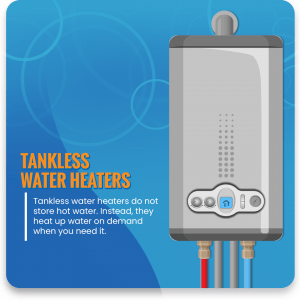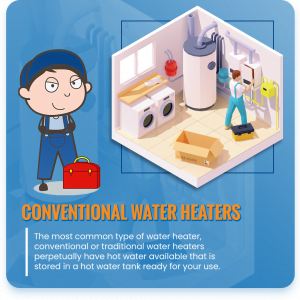Did you know water heating accounts for about 20% of your home's total energy use? A new water heater can reduce your home's energy consumption drastically. If you're wondering which type of water heater better replaces your old and inefficient model, you've come to the right place.
Keep reading to learn about water heater types and which is the best water heater to buy!
Understanding the Basic Differences between Tankless Water Heater and Tank Type Water Heater
Whether you're looking for water heater replacement or water heater installation, you must understand the fundamental differences between the two main types. Tank type water heaters have a reservoir of hot water ready to be used, while tankless models heat water directly without a tank. As with either type, a water treatment system will increase the life of these appliances and reduce cost of operating.
Tankless Water Heater

Tankless water heaters generally provide about 2-5 gallons of hot water per minute, depending on the energy source. Tankless water heaters function by sending cold water through a heat exchanger within the unit, and then either a natural gas burner or electric heating element heats the water.
Common Uses of Tankless Water Heaters
Tankless water heaters have the advantage of constant water on demand, but when multiple hot water sources are being used in a home, this can push them to the limit. It's often common for a home to have devoted tankless units for appliances such as laundry machines and dishwashers.
Tankless water heaters can be between 24% and 34% more efficient than the tank variety and also tend to last longer. Without water heater repair, most tankless owners can expect about 20 years of reliable service.
While the cost and installation of a tankless system might be higher, the energy savings make them much less costly to operate overall.
Popular brands of tankless water heaters include:
Tank Water Heater

A standard tank water heater works by heating a water reservoir, usually between 20-80 gallons. When hot water is needed, it flows from the top of the tank, and cold water enters through the bottom of the tank to replace it. This process ensures that the tank is always full of hot water at your disposal.
Fuel sources for tank water heaters include natural gas, propane, fuel oil, and electricity. Since tank type water heaters rely on a thermostat to heat the tank, energy losses into the environment occur if not properly insulated. Models with a heavily insulated tank will have a thermal resistance of R-24 or above and offer the most negligible energy loss.
Common Uses of Tank Water Heater
Much less expensive to purchase and install than tankless water heaters, tank style units have long been a popular choice for both homeowners and commercial applications. Buying a unit with a more extensive reservoir will ensure you have plenty of available hot water and bring more potential for energy loss. Gas and oil water heaters also carry with them potential venting energy losses.
It may be tempting to purchase a low-cost tank water heater, but you will inevitably lose money in the long run due to energy loss. Consider your fuel source and the thermal resistance rating before investing in a tank style unit.
Popular brands of tank style water heaters include:
- AO Smith
- State
- GE
- Whirlpool
- Rheem
- Bradford
- Westinghouse
Which Water Heater Should I Buy?
Choosing the best water heater for you comes down to your needs and budget. While a tank system will be less expensive to purchase and install, it will have inherent energy losses and be more costly to operate in the long run. Tank style water heaters are also less reliable than tankless water heaters and require more maintenance over their lifespan.
The main benefit of a tankless system is having an unlimited supply of hot water on demand at any given moment, as there's not a finite amount of water in the reservoir limiting them. Tankless water heaters are far more energy-efficient but have higher prices and installation fees. Many tankless owners find that the energy savings offset these initial costs over time.
Pros and Cons of Tankless Water Heaters
There are both advantages and disadvantages in replacing your water heater with a tankless type. Installation and efficiencies are to name a few.
Pros:
- Pro: Instant hot water
- Pro: Longer lifespan
- Pro: Lower monthly cost
- Pro: Space savings
- Pro: Special financing and tax breaks
- Pro: Eliminates standby energy loss
- Pro: Never run out of hot water
- Pro: Tankless heaters offer more extended warranties
Cons:
- Con: Inconsistent temperatures
- Con: It takes a while to realize energy savings
- Con: Rerouting gas or electric lines
- Con: Additional equipment is often needed
- Con: Standard Energy Star water heaters are also efficient
- Con: Higher initial cost
Pros and Cons of Standard Tank Water Heaters
Below is a list that will help make a decision before you run out and purchase a new water heater. It's not just about cost or installation of a new water heater type.
Pros:
- Pro: Lower purchase and installation cost
- Pro: Ready for multiple uses
- Pro: Inexpensive to replace and repair
- Pro: More consistent temperatures
Cons:
- Con: Require more maintenance
- Con: Water wasted while waiting for hot water to arrive
- Con: Poor energy efficiency
- Con: The unit is always on
- Con: Big and bulky units
Which Water Heater Is the Best?
Choosing which water heater is best for you depends on your energy source, hot water needs, and overall budget. Contact our certified water heater expert in Orlando, FL for a free estimate and consultation. Choice Plumbing Orlando can help you choose and install the best water heater that will serve you for years to come, no matter the application.
More Plumbing Advice:
How To Choose a New Water Heater

